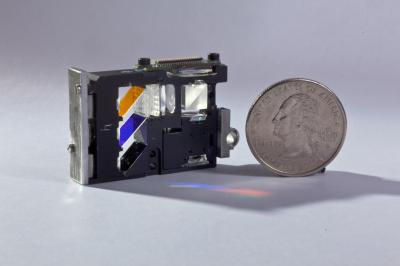ImagineOptix and North Carolina State University researchers have jointly developed a new technology, though which unpolarized light can be transformed into polarized light. This will promote energy efficiency by two-fold to liquid crystal (LC) technology-based projectors. This new technology contributes to the creation of compact, efficient, affordable projectors with reduced levels of heat and extended battery life.
 Researchers used new polarization grating-polarization conversion system technology to create a small picoprojector, seen here, which could be embedded in a smartphone, tablet or other device. Credit: ImagineOptix Corp.
Researchers used new polarization grating-polarization conversion system technology to create a small picoprojector, seen here, which could be embedded in a smartphone, tablet or other device. Credit: ImagineOptix Corp.
Polarized light is capable of serving as a light source for all LC projectors. But LEDs generate unpolarized light. The light generated by LEDs therefore has to be transformed into polarized light prior to any application.
Light can be polarized by just making the unpolarized light pass through a polarizing filter. This process however produces more heat and also dissipates light.
The new technology developed at NC State facilitates 90% of the unpolarized light to be polarized and hence utilized by the projector.
Based on this novel technology, the ImagineOptix-sponsored research team developed a compact "picoprojector," that can be incorporated within a tablet, smartphone, or other device.
Unlike in conventional polarization filters, only 10% of the unpolarized light is transformed into heat. Furthermore, the new technology will allow more compact designs, thereby eliminating the need for noisy cooling fans.
This small single-unit assembly technology is made up of four immobile components. It starts with the passing of a beam of unpolarized light via an array of lenses. The light is then directed onto a grid of spots and then moves through a polarization grating that includes a glass plate covered by a thin layer of liquid crystal material. The spots of light are then divided into pairs using polarization grating. These pairs have opposite polarizations. The beams of light attain the same polarization by passing via a louvered wave plate. A second array of lenses ultimately focuses the light spots again into a single, uniform beam of light.
The paper titled "Efficient and monolithic polarization conversion system based on a polarization grating," was published in Applied Optics on July 10.